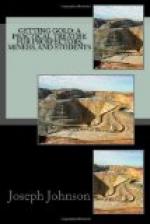If you would be more particular take a small spring balance or an improvised scale, such as is described in Mr. Goyder’s excellent little book, p. 14, which will enable you to weigh down to one-thousandth of a grain. It is often desirable to burn your stone before crushing, as it is thus more easily triturated and will reveal all its gold; but remember, that if it originally contained much pyrites, unless a similar course is adopted when treated in the battery, some of the gold will be lost in the pyrites.
Having crushed your gangue to a fine powder you proceed to pan it off in a similar manner to that of washing out alluvial earth, except that in prospecting quartz one has to be much more particular, as the gold is usually finer. The pan is taken in both hands, and enough water to cover the prospect by a few inches is admitted. The whole is then swirled round, and the dirty water poured off from time to time till the residue is clean quartz sand and heavy metal. Then the pan is gently tipped, and a side to side motion is given to it, thus causing the heavier contents to settle down in the corner. Next the water is carefully lapped in over the side, the pan being now tilted at a greater angle until the lighter particles are all washed away. The pan is then once more righted, and very little water is passed over the pinch of heavy mineral a few times, when the gold will be revealed in a streak along the bottom. In this operation, as in all others, only practice will make perfect, and a few practical lessons are worth whole pages of written instruction.
To make an amalgamating assay that will prove the amount of gold which can be got from a ton of your lode, take a number of samples from different parts, both length and breadth. The drillings from the blasting bore-holes collected make the best test. When finely triturated weigh off one or two pounds, place in a black iron pan (it must not be tinned), with 4 ozs. of mercury, 4 ozs. salt, 4 ozs. soda, and about half a gallon of boiling water; then, with a stick, stir the pulp constantly, occasionally swirling the dish as in panning off, till you feel certain that every particle of the gangue has come in contact with the mercury; then carefully pan off into another dish so as to lose no mercury. Having got your amalgam clean squeeze it through a piece of chamois leather, though a good quality of new calico previously wetted will do as well. The resulting pill of hard amalgam can then be wrapped in a piece of brown paper, placed on an old shovel, and the mercury driven off over a hot fire; or a clay tobacco pipe, the mouth being stopped with clay, makes a good retort (see “Rules of Thumb,” pipe and potato retorting). The residue will be retorted gold, which, on being weighed and the result multiplied by 2240 for a 1 lb. assay, or by 1120 for 2 lb., will give the amount of gold per ton which an ordinary battery might be expected to save. Thus 1 grain to the pound, 2240 lbs. to the ton, would show that the stuff contained 4 oz. 13 dwt. 8 gr. per ton.




